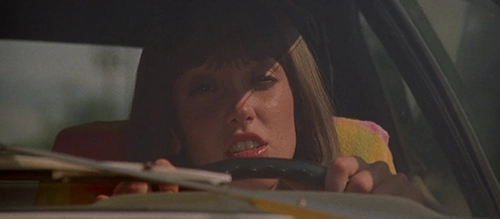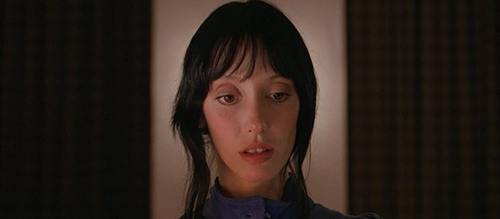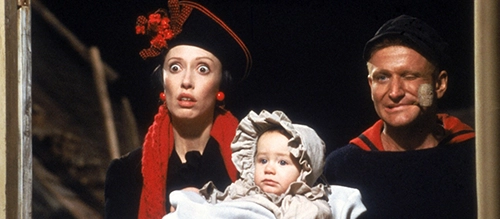Shelley Duvall: 3 Career-Defining Performances
American actress, writer, producer and artist Shelley Duvall has had a silver screen career defined by her commendable and unforgettable portrayals. Throughout her short but unmissable period in the limelight, Duvall earned numerous accolades including the prestigious Best Actress award at the Cannes Film Festival in 1977, but is perhaps best known for her performance in The Shining (1980).
Although her career is most memorable for her work and confrontations with iconic director Stanley Kubrick, Shelley Duvall’s film career was shaped the most by her frequent collaborations with award-winning director Robert Altman. From 1970 to 1980, Duvall featured in seven of Altman’s films, even making her acting debut in the director’s 1970 film Brewster McCloud after some of the crewmembers working on the film discovered her at a party and were amused by her selling artwork made by her then-husband Bernard Sampson. They convinced her to bring some of the paintings along to an “art patron” they knew – which turned out to be an audition with Robert Altman and his producer, Lou Adler.
Duvall continued acting for 30 years, going on to host and produce ‘Shelley Duvall’s Faerie Tale Theatre’, which ran from 1982 to 1987 and retold classic fairy tales for kids. In 2002, however, Duvall made what was to be her final performance in Manna from Heaven, around which time she announced her retirement from acting and moved back to her home state of Texas. Not much was heard from her for around 20 years, until she made her return to acting in 2023 horror film The Forest Hills.
Although she took such a large break from acting, her impact as a performer can still be felt: Duvall’s filmography offers some of cinema’s greats, and her influence is still evident across the performances fronting Hollywood films to this day. She gave something real to the films she was in, her large eyes filling the screen, lending an innocence to each of her characters and endearing us to her. She has been celebrated for iconic fashion and incredible performances, her diversity and range proving her incredible talent as a performer. These are the three performances that best define her career, Shelley Duvall’s most significant contributions to cinema.
Follow @thefilmagazine on Twitter.
1. 3 Women (1977)

Inspired by a dream that director Robert Altman had, 3 Women follows the lives of three very different women who become mixed up in each other’s lives (and personalities). Pinkie Rose (Sissy Spacek) becomes strangely fascinated with her co-worker turned roommate, Millie Lammoreaux (Shelley Duvall), adapting her mannerisms and attempting to become her. The film was influenced by Ingmar Bergman’s Persona (1966), and explores themes of identity and the ways that women lend and borrow such personal things from one another. Although there is conflict between these women, and they don’t ever seem to find a comfortable meeting point, this film is ultimately about what unites them.
Shelley Duvall’s performance as Millie Lammoreaux borrowed a lot from her own identity. Duvall was responsible for writing all of Millie’s diary entries, as well as decorating her apartment and selecting the food – key components of Millie’s character. She is vain, so often focused on her appearance and trying to impress people, and yet she remains endearing. Duvall’s slender frame, doe eyes, long lashes, and perfectly styled bob give her character a sense of perfection that Duvall seemed to radiate.
She carries herself as if she doesn’t notice her coworkers ignoring her, as if she is a polished, perfect, and happy person. But it’s that shiny demeanour that makes us feel sad for her. Millie walks out of work each day with two other women, and chats to them all about the recipes she has saved and written down. She’s so tall that she peers over the two women, but her words fall on deaf ears. Duvall has a way of focusing her body language towards them, as if they’re also engaged in the conversation. She’s desperate to earn their attention, to share as many quips and titbits as she can before she parts ways and heads to her car, never fully turning her head away even as she is walking away. It’s almost as if she doesn’t realise people find her annoying. Her smile never seems to falter, even as people are rude to her face. Millie appears to have everything, but really she lives a very lonely life.
It is only when Pinkie becomes more integrated into Millie’s life that Millie’s shiny exterior begins to crack. Pinkie’s clumsiness makes her the perfect scapegoat for Millie’s misfortune and she begins to snap at her. Duvall plays a very subtle kind of cruel, in her narrowed eyes and pointed tone. Her patience visibly wears thin, and builds to a crescendo at the climax of the film, Duvall shaking and screaming with a level of rage that didn’t seem possible at the beginning of the film.
Shelley Duvall won the award for Best Actress at Cannes Film Festival in 1977 for her performance in 3 Women. It was not only her first time winning an award, but also her first time being nominated. It was her performance in this film that caught the eye of Stanley Kubrick, director of The Shining, who rang her on the phone and told her she was great at crying – and consequently offered her the role of Wendy Torrance.
2. The Shining (1980)

Adapted from Stephen King’s novel of the same name, Stanley Kubrick’s The Shining is a masterpiece of modern horror. The iconic imagery of the Grady sisters stood at the end of the hall, Jack Nicholson’s psychotic performance, and the eerie Overlook Hotel are familiar to most film fans. But what really drives the horror within each frame of The Shining is Shelley Duvall’s performance.
Duvall plays Wendy Torrance, wife of Jack Nicholson’s Jack Torrance, the latter of whom has just taken a job as caretaker of the isolated Overlook Hotel whilst it’s closed for the winter. The couple travels there with their son, Danny (Danny Lloyd), to stay in the vast hotel by themselves. As the snow blocks the roads and isolates the family, they descend into madness and begin to turn on each other as the evil of the hotel takes over.
The Shining is famous for director Stanley Kubrick’s treatment of his cast, particularly Shelley Duvall. Kubrick insisted on doing numerous takes for his scenes, expressing disappointment when the actors appeared not to know their lines properly. The infamous staircase scene, in which Jack threatens to bash Wendy’s brains in whilst she cries and swings a bat at him, was apparently shot 127 times. Whilst this number has been disputed in recent years (Steadicam operator Garrett Brown states the number of takes was between 35 and 45), it doesn’t detract from the fact that the actors were still being forced to repeat the scene to the point of exhaustion. Duvall is said to have cried so much during filming that she was no longer able to produce tears, and had to rehydrate between takes.
The result of this repetition, whilst unfair, was a more accurate depiction of insanity. Shelley Duvall’s Wendy has often been described as ‘over-the-top’, but how else should she be reacting when her husband is threatening to kill her? This is what makes her portrayal so brilliant, so personal, and so interesting to watch. There are moments where her eyes almost pop out of her head, where she’s shaking in fear. Her screams feel real. But there are also moments where the fear is lying just under her breath, just in the slightest change of her gaze.
There are two versions of The Shining – Kubrick cut 31 minutes of material from the film after its initial release in the US. However, in the original 144 minute version, there is a scene in which Wendy is speaking to a doctor about her son, and discloses her husband’s alcoholism. Shelley Duvall plays this moment with incredible composition, presenting the gravity of the information not in her words, but in her nervous smiles and shifting eyes. It is in this moment early on in the film, which contains no elevators of blood or decaying bodies, that Duvall presents a sort of domestic horror, the kind of horror that happens behind closed doors and doesn’t get spoken about.
Alex Essoe, who played Wendy as an almost exact copy of Duvall in Doctor Sleep (2019), with the same loose black ponytail and fringe, said of the part: “It is very big shoes to fill. I think that Shelley Duvall’s performance in (The Shining) is the closest thing to a perfect performance in something.”
Shelley Duvall’s performance is beyond iconic, her dedication to the role allowing for one of the greatest and most recognisable performances in horror cinema.
Recommended for you: 10 Best The Shining Moments
3. Popeye (1980)

The final of seven collaborations between Shelley Duvall and Robert Altman, Popeye (1980) was a movie musical adaptation of the ‘Popeye’ cartoons, which originated as a comic strip. Popeye made his first appearance in the Thimble Theatre comics in 1929, and came to life as an animated cartoon that ran from 1933-1957. The film (which began shooting in January of 1980, and was released in December of the same year) starred Robin Williams as the titular Popeye, and Shelley Duvall as the self-described “femme fatale”, Olive Oyl. Lively, sweet, and full of comic humour, Popeye is everything you could ask for from a live-action cartoon adaptation.
When Popeye turns up in the seaside town of Sweethaven and lodges with the Oyl family, he meets the daughter of the family, Olive Oyl. Olive doesn’t seem keen on Popeye, or anything else for that matter (she can’t seem to find a nice hat for her engagement party to town brute Bluto), but she finds herself growing fond of him after they take in an abandoned baby together and name him Swee’pea.
Duvall offers an extraordinary caricature of a cartoon character. She moves like she has been animated, bouncing up the stairs and peering around corners with just the right amount of exaggeration. Her constant exclamations of “oh!”, and her fiery jabs at Popeye, are funny and characteristically endearing, showing us the kind of strong woman she is without making her unlikeable. It’s a different Duvall than we’ve seen before – she’s playful, witty and sharp.
Popeye served as not only a wonderful conclusion to Duvall’s work with Robert Altman, but also as a brilliantly colourful movie musical about family and standing up for yourself. Popeye stands the test of time, and is a wonderfully accessible film for those who grew up with the character on TV, as well as those who are just meeting him for the first time. Shelley Duvall’s southern twang and expressive face bring Olive Oyl to life, creating an unforgettable performance. It was on the set of Popeye that she came up with the idea for her ‘Faerie Tale Theatre’ show, as she was reading ‘The Frog Prince’ and had asked Robin Williams for his opinion. He later appeared in the series, in the ‘Frog Prince’ episode.
Popeye is the first and only time that there has been a live-action adaptation of the comic book character. Shelley Duvall and Robin Williams bounce off each other brilliantly, especially with this being Williams’ feature film debut. Popeye received two thumbs up from Gene Siskel and Roger Ebert, a shining seal of approval from the two iconic film critics. In an interview with Roger Ebert, Shelley Duvall said of playing Olive Oyl: “I’ve never before been allowed to play a woman of any strength, of depth. And although Olive Oyl is a cartoon character, I think she does have depth. All of the other characters I’ve played in the movies, to me, they never really broke the surface. But Olive Oyl is 101 percent woman! She’s not Popeye’s ‘girlfriend’ I see her as a real femme fatale.”
Recommended for you: Jack Nicholson: 3 Career-Defining Performances
Across just twenty years, Shelley Duvall managed to deliver some of the era’s most memorable and celebrated performances. She showed incredible range and diversity, bringing elements of herself into her performances in ways that are not always easy. In the three films referenced, and several more for which she deserves commendation, Shelley Duvall brings an incredible sense of power, portraying deep, layered, strong, and capable women.
Written by Holly Carter
You can support Holly Carter in the following places:
Portfolio: hollycartertheatre.com
Twitter: @hollyhollyca

